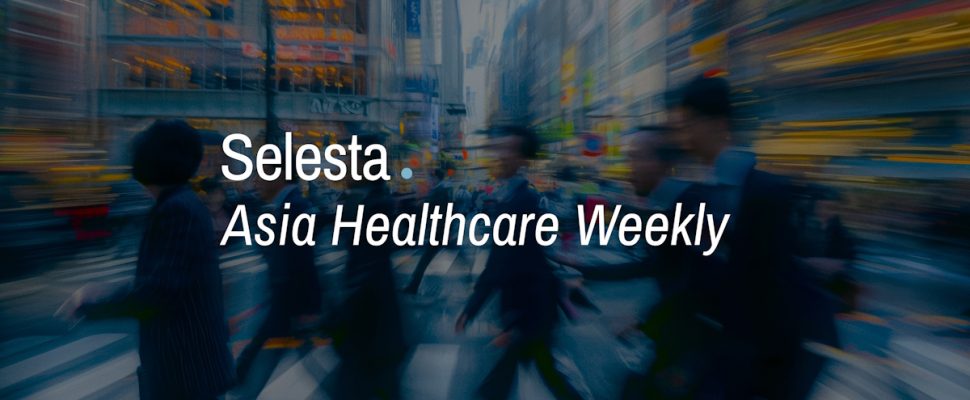This week’s Asia healthcare and pharma roundup from PharmaBoardroom content partner Selesta covers China’s USD 36.2bn in outbound licensing agreements, Henlius & EssexBio meeting Phase III endpoints, Organon acquiring US rights of tocilizumab biosimilar from Biogen, GE Healthcare’s acquisition of Japan’s Nihon Medi-Physics, Wuxi Biologics’ disposal of vaccine facility to Merck for USD 500mn, and Cathay Capital and Sanofi’s USD 275mn fund to back China innovative pipeline.
China innovative drug outbound licensing reaches 33 in transaction volume, exceeding USD 36.2bn in total deal value
Key words: Out-license, innovative drugs, ADC, China
Innovative drug outbound licensing from Chinese pharma/biotech marked a historic milestone in 1Q25, securing 33 overseas licensing agreements with disclosed values exceeding USD 36.2bn. The surge follows a pivotal shift in 2023, when China’s outbound drug licensing deals surpassed inbound partnerships for the first time. Domestic companies have expanded their global footprint through multi-faceted strategies, including licensing-out, collaborative NewCo ventures with MNCs, and independent commercialization in key overseas markets.
In 1Q25, GeneQuantum struck two major strategic collaborations with US-based Biohaven and South Korea-based AimedBio, with total deal value of USD 13bn. Two transactions tied for the highest upfront payments of 1Q25 at USD 200mn each. United Labs (3933 HK) out-licensed ex. Greater China rights for its GLP-1/GIP/GCG triple agonist obesity therapy UBT251 to Novo Nordisk (NOV US), while Hengrui (600276 CH) out-licensed the ex. Greater China rights of oral Lp(a) inhibitor HRS-5346 to Merck (MRK US). Over 55 percent of 1Q25 deals involved early-stage assets in preclinical or Ph I/II development, signaling strong confidence in China’s emerging innovative drug pipeline.
ADCs remained a focus among all outbound licensing deals, accounting for 8 out of the 33 deals and a combined deal value of USD 16.5bn. Notably, two partnerships underlined combination therapies: Medilink’s B7H3 ADC with AstraZeneca’s (AZN US) durvalumab, and BioCity’s CDH3 ADC with Merck’s Keytruda. Unlike previous deals, none of the 1Q25 ADC deals targeted mainstream markers like HER2 or Trop2, highlighting a strategic pivot toward novel mechanisms.
Source: Company announcements
Henlius/EssexBio’s HLX04-O meets primary endpoint in Ph III wAMD trial
Key words: Drug R&D, ophthalmic, China
Henlius (2696 HK) and Essex (1061 HK) announced that the Ph III clinical study of HLX04-O (recombinant anti-VEGF humanized mAb, bevacizumab biosimilar) in Chinese patients with wAMD (wet age-related macular degeneration) has met the primary study endpoint. HLX04-O is a new ophthalmic drug based on bevacizumab independently developed by Henlius. Henlius and Essex entered partnership to co-develop HLX04-O for ophthalmic indications in 2020, under which Henlius and Essex will bear 20 and 80 percent of the costs and expenses related to the R&D activities, respectively.
The trial is a multi-center, randomized, double-blind, active-controlled, non-inferiority Ph III clinical trial aimed to compare the efficacy and safety of HLX04-O with I.V ranibizumab in wAMD patients. Patients enrolled were randomized 1:1 to receive either HLX04-O (1.25mg) or ranibizumab (0.5mg), administered every 4 weeks. The treatment continued for 1 year. The primary endpoint of this study was mean change of letters in BCVA (best corrected visual acuity) from baseline at week 48; secondary endpoints included other efficacy, safety, tolerability, and PK. The results showed that the primary endpoint of this study was met, with the mean change in BCVA from baseline at week 48 in the HLX04-O group being non-inferior to that in the ranibizumab group. Additionally, HLX04-O had a good safety profile, with similar overall, ocular and non-ocular safety results compared to ranibizumab in wAMD.
In addition to the China Ph III study which has met its primary endpoint, an international multi-center Ph III clinical study of HLX04-O in wAMD is ongoing in EU, Australia, America and mainland China, etc. In 2023, the Ph I/II study of HLX04-O in wAMD has shown its safety and tolerability and demonstrated preliminary efficacy.
Source: Company announcement
Organon acquires US rights of tocilizumab biosimilar from Biogen and Bio-Thera
Key words: Out-license, China, US
Organon (OGN US) announced that it has acquired from Biogen (BIIB US) regulatory and commercial rights in the US for TOFIDENCE (tocilizumab biosimilar). TOFIDENCE, the first tocilizumab biosimilar approved in the US, was launched in 2024 and is indicated for moderately to severely active rheumatoid arthritis, giant cell arteritis, polyarticular juvenile idiopathic arthritis, systemic juvenile idiopathic arthritis, and COVID-19.
Under the terms of the agreement, Organon has acquired the regulatory and commercial rights to TOFIDENCE in the US, available in three vial sizes, 80mg/4ml, 200mg/10ml, and 400mg/20ml, for further dilution prior to intravenous infusion. Bio-Thera (688177 CH), the product developer, will maintain manufacturing rights for TOFIDENCE for the US market. The agreement includes an upfront payment to Biogen, with Organon assuming the obligation to pay tiered royalty payments based on net sales and tiered annual net sales milestone payments owed by Biogen to Bio-Thera.
Source: Company announcement
GE Healthcare completes acquisition of Japan Radiopharma Nihon Medi-Physics
Key words: Acquisition, Japan, US
GE HealthCare (GEHC US) announced that it has completed its acquisition of the remaining 50 percent stake in NMP (Nihon Medi-Physics) from Sumitomo Chemical, giving it full ownership. As part of GE HealthCare, NMP can further build on its expertise in developing and manufacturing proprietary and in-licensed radiopharmaceuticals used in SPECT (single photon emission computed tomography) and PET (positron emission tomography) molecular imaging procedures to detect and diagnose disease.
NMP’s product portfolio includes GE HealthCare radiopharmaceuticals used to enable molecular imaging across neurology, cardiology and oncology procedures. Headquartered in Tokyo, NMP was formed in 1973 and generated revenues of JPY 28.2bn (USD 183mn) in 2023. GE HealthCare acquired Amersham in 2004, and subsequently held a 50 percent stake in NMP.
Source: Company announcement
Wuxi Biologics completes disposal of Ireland vaccine facility to Merck for USD 500mn
Key words: CDMO, tariff, China, Ireland
Wuxi Biologics (2269 HK) announced that it has completed the asset disposal of its Ireland vaccine facility to Merck (MRK US). The two companies have been collaborating on the Dundalk site since 2019, when Wuxi Biologics agreed to build the vaccine manufacturing facility. In Jan 2025, Wuxi Biologics announced the plan to sell its vaccine manufacturing facility in Dundalk to Merck for USD 499.63mn. The deal followed a series of moves by the company to sell off sites in the US and EU as the prospect of the Biosecure Act is deterring potential clients.
Notably, US President Donald Trump signed an executive order this week, establishing a 10 percent “floor tariff” on imports from US trade partners, with higher levies imposed on select goods. The move exempts multiple critical sectors including steel, aluminum, automobiles, pharmaceuticals, and semiconductors. The US government asserted that maintaining US’ “security umbrella” requires rebuilding domestic manufacturing ecosystems in strategic fields, such as bio-manufacturing, batteries, and microelectronics.
Pharmaceutical industry in Ireland emerges as a focal point in the policy shift, as the country hosts the largest number of US FDA-approved drug manufacturing plants outside the US, making it both a vital production hub and a prime target for tariffs. While China accounts for 13 percent of APIs used in the US, Ireland represents 26 percent of US pharmaceutical and medical device imports. Major pharma players have significantly expanded Irish operations in recent years, including AbbVie (ABBV US), Merck and Eli Lilly (LLY US). The move raises concerns about potential supply chain disruptions for critical medications if tariffs escalate.
Source: Company announcement
Cathay Capital and Sanofi set up USD 275mn fund to back China clinical-stage innovative pipeline
Key words: Funding, China, France
Cathay capital and Sanofi (SNY US) announced that they have joined hands to launch a new fund to invest RMB 2bn (USD 275mn) primarily in clinical-stage innovative drug pipeline and relevant industry opportunities in China. The fund aims to help Chinese pharma/biotech companies accelerate their process of commercialization and accessing local markets globally.
The fund is built on Cathay’s existing collaboration with Sanofi, which made an investment in Cathay’s multi-stage VC platform Cathay Innovation in 2020, primarily focusing on China healthcare innovations. In Dec 2024, Sanofi revealed its plan to invest USD 1.1bn to build a new insulin production base in Beijing, marking its biggest single investment in China to date.
Source: Company announcement
Huadong Medicine files NDA for semaglutide biosimilar in China
Key words: Registration, GLP-1, China
Huadong Medicine (000963 CH) announced that it has filed NDA of its HDG1901 (semaglutide biosimilar) with China NMPA for the treatment of adults with type 2 diabetes. Huadong’s HDG1901 is the 5th domestic version of semaglutide entering NDA stage in China, following Jiuyuan Gene (2566 HK), Livzon (1513 HK/000513 CH), Qilu Pharma, and United Labs (3933 HK).
Novo Nordisk’s Ozempic (semaglutide) was first approved for diabetes by US FDA in 2017 and by China NMPA in 2021. A weight-management version of Ozempic – Wegovy – gained China NMPA approval in 2024. Ozempic generated USD 17.8bn global sales in 2024, including USD 820mn in Greater China. Wegovy posted global sales of USD 8.6bn, with USD 29mn in Greater China.
A Ph III trial for diabetes, completed in Oct 2024, compared HDG1901 with Novo’s Ozempic in diabetes patients inadequately controlled by metformin. The weight-management trial of HDG1901 began enrollment in Dec 2024.
Source: Company announcement, China NMPA
Luye Pharma’s rivastigmine twice weekly transdermal patch approved in Japan for Alzheimer’s dementia
Key words: Alzheimer’s, China, Japan
Luye Pharma (2186 HK) announced that marketing approval for its innovative formulation rivastigmine twice weekly transdermal patch has been approved in Japan, indicated for suppression of progression of dementia symptoms in mild to moderate Alzheimer’s disease. The product is to be marketed as Rivaluen LA Patch 25.92mg/51.84mg. It is the first extended-release rivastigmine transdermal formulation approved for marketing in Japan.
Developed by Luye on its proprietary platform for transdermal patches, Rivaluen LA Patch 25.92mg/51.84mg employs an innovative drug delivery system to release the active ingredient, rivastigmine, transdermally twice a week. This approval is based on the positive results of a Ph III clinical trial conducted in Japan for patients with Alzheimer’s dementia which met the primary efficacy endpoint.
Source: Company announcement




